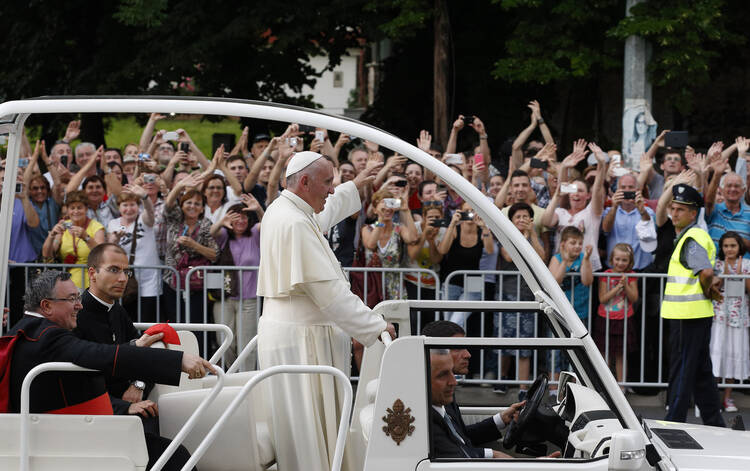Pope Francis gave a seven-minute press conference on the 90 minute flight back from Sarajevo on June 6. He was in amazingly good form, totally energized, in spite of a hectic eleven-hour, action packed visit, and in the short time available he insisted on greeting individually each of the more than 60 reporters that accompanied him.
He then responded to questions: He first addressed the question of Medjugorje –the shrine connected with the alleged apparitions of Our Lady, and revealed that he will take a decision soon. Then he spoke about those who speak of peace but foment war by trafficking in arms. In answer to a third question, he talked about the risk of becoming slaves of the computer, and the need to exercise judgment about which television programs to watch. Pressed at the end by a French reporter, he confirmed he would go to France as he had promised the bishops there, but he didn’t say when.
Note: The following is my own translation of the entire press conference.
Many pilgrims have come here from Croatia and there is much interest on whether you will go to Croatia. And since we are in Bosnia-Herzgovina many are asking what is your judgment on the phenomenon of Medjugorje?
On the problem of Medjugorje: Benedict XVI, in his day, set up a Commission headed by Cardinal Ruini, composed of other cardinals and theologians. They made a study, and Cardinal Ruini came to me and gave me the study after many years of work, three or four I think. They did a good job, a good job. Cardinal Muller (note: prefect of the Congregation for the Faith) told me that in these days he would hold a session (of the congregation) on this question. I think it was held on the last Wednesday of the month, but I am not sure. We are going to take decisions soon, and then they will be communicated. For the moment, only some orientations will be given to the bishops, on the paths to be taken. (NB. Fr Federico Lombardi, Director of the Vatican Press Office said later that the Congregation for the Doctrine of the Faith has not yet held the meeting mentioned by the pope.)
As for the visit to Croatia, I don’t know when it will be. I remember the question you asked when I went to Albania. (You said) you begin the visit to Europe but starting with a country that’s not in the European Union. And answered: it’s a sign. I want to begin the visit to Europe in small countries, and in the Balkans there are martyred countries that have suffered much.
You have spoken about those who deliberately foment the climate of war, and then you told the young people: there are powerful ones who speak of peace but under the table they straffick in arms. Could you say something more on this?
There’s always hypocrisy, and for this reason I said that it’s not sufficient to speak of peace. Peace must be made. The one who only talks of peace but does not make peace contradicts himself. The one who speaks of peace but foments war, for example, by selling arms, is a hypocrite.
You spoke in some detail to the young people, in your last talk, about the need to exercise much care in what they read and what they see (on TV and in the computer): you didn't exactly use the word 'pornography', but you used the word 'bad fantasies.' Could you elaborate a little more on this concept?
There are two different things: the modalities and the contents. As regards the modalities, there is one that can do harm to the soul and that is being too attached to the computer. This harms the soul and takes away freedom; one becomes a slave of the computer. It’s interesting that in many families, the fathers and mothers tell me that when we’re at table with the children, they are on the cellular phones and in another world. It’s true that virtual language is something we cannot ignore; it’s progress for humanity. But when it takes us away from the family, from social life, from sport, from art and we remain attached to it, then for sure it is a psychological illness.
Secondly, as for the contents: Yes, there are ‘dirty things’ that go from pornography to semi-pornography, from empty programs devoid of values, to ones that are relativistic, hedonistic and consumeristic, which foment all these things. We know that consumerism is a cancer of society, relativism is a cancer of society, and I speak about this in the next encyclical that will be issued this month. I used the word ‘dirty’ in a general sense.
There are parents that are very concerned and do not allow computers in the rooms of their children, they must be in a common place in the home. This is a small help that the parents give their children to avoid these things.
Pressed by a French reporter at the end of the press conference (the question was not audible) whether he would visit France, given the ‘problems’ with the French government. (Reporters interpreted this as an allusion to the fact that the Holy See has not yet given its agreement to the candidate proposed by the Government to be its ambassador there, allegedly because he is homosexual.) He responded:
I will go to France. I promised the French bishops that I would go. As for problems: little problems are not problems!








